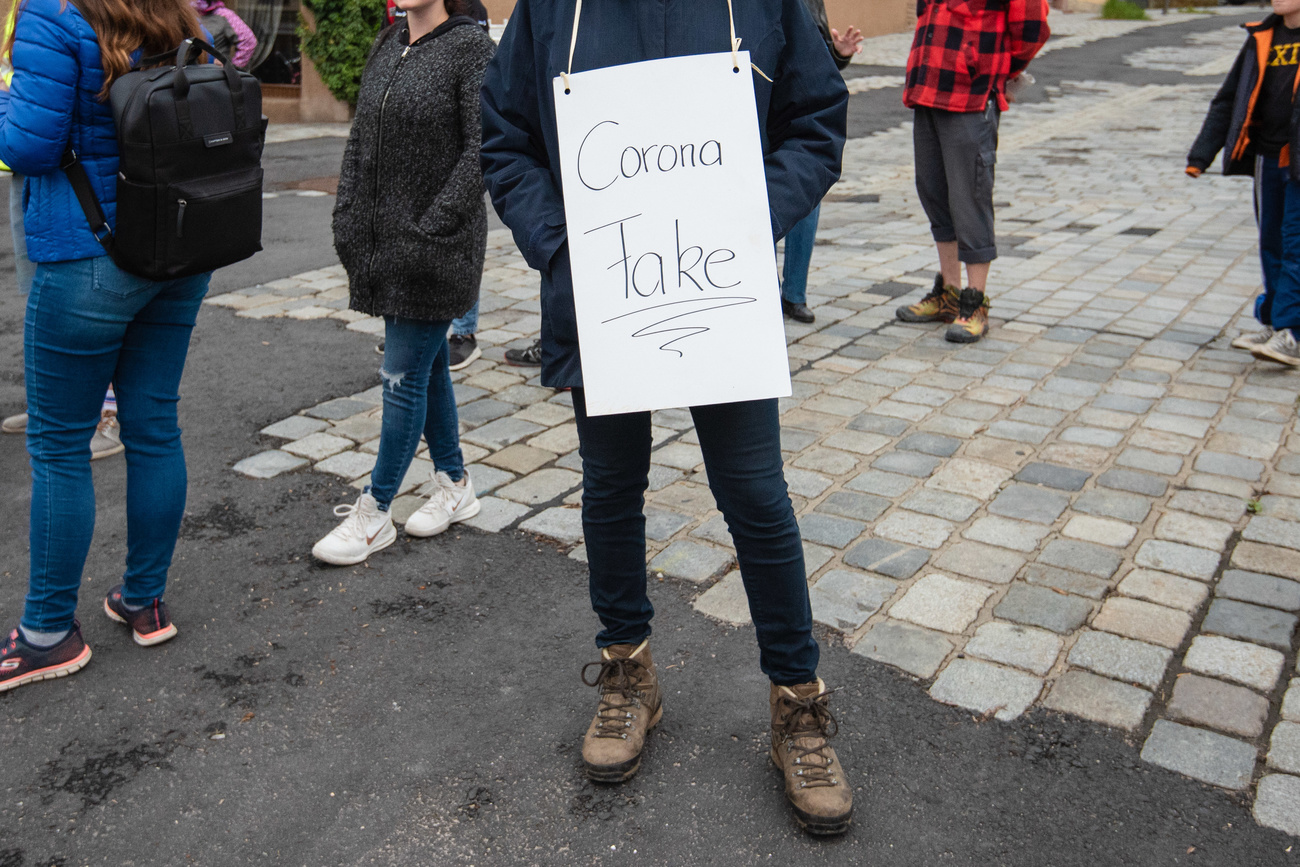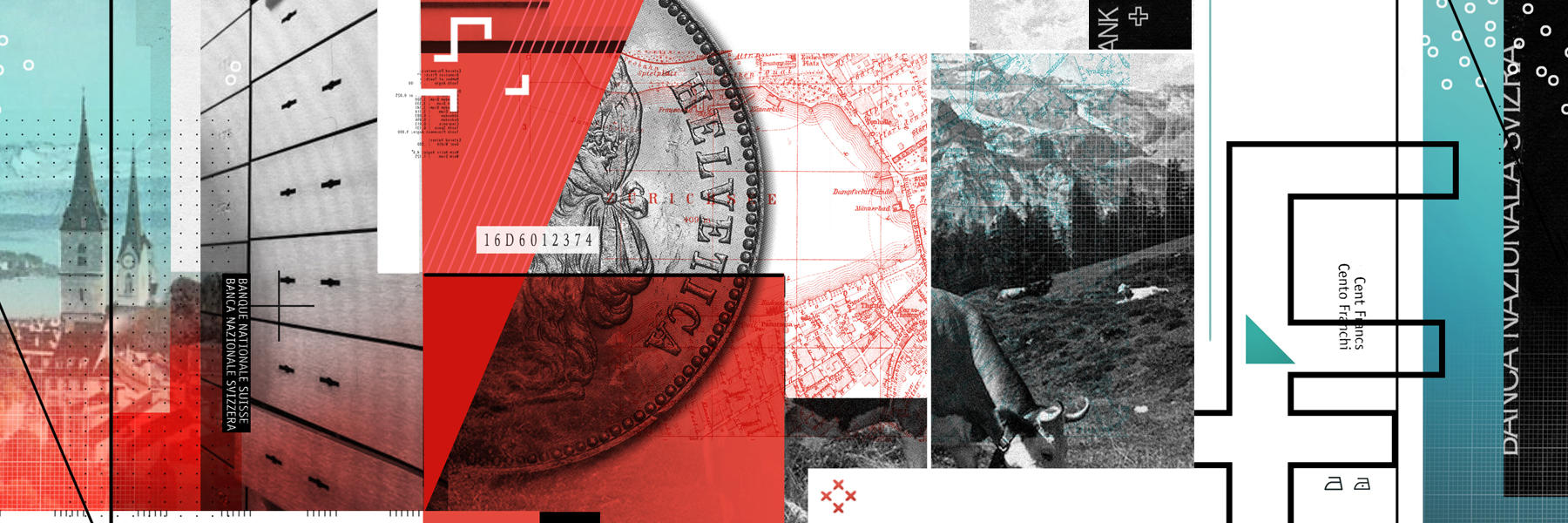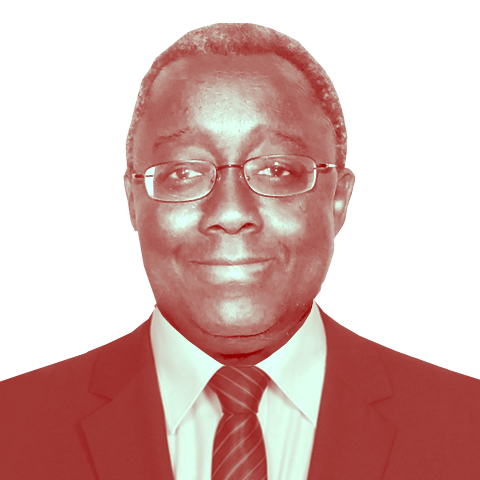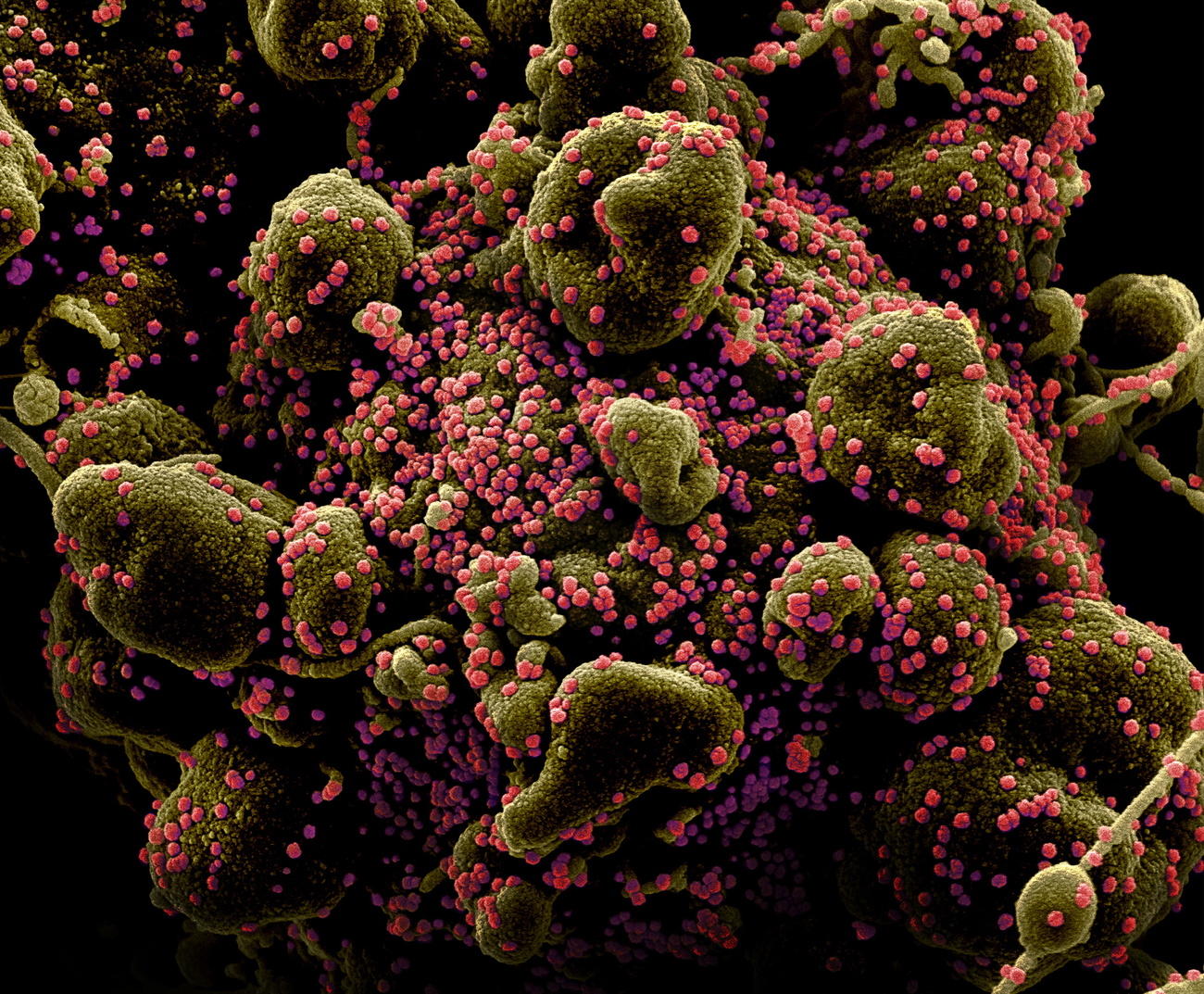Resisting Covid-19 ‘fake news’ with a high dose of public trust

Misinformation about Covid-19, like the pandemic itself, has gone global. And like the virus, it has affected some countries more than others. Where does Switzerland, which has seen alternative media and conspiracy theorists gain in popularity, sit on the “infodemic” spectrum?
Is the novel coronavirus a bioweapon created in a Chinese lab or something Microsoft founder Bill Gates created in order to profit from an eventual vaccine? Or did the virus even exist in the first place? One leader of anti-lockdown protestsExternal link in Switzerland doubts it did.
In recent months the voices of Swiss conspiracy theorists and alternative media have been amplified, as they exploit both the crisis and social media platforms to spread rumours and reach a bigger audience.
It’s all part of an “infodemic”, a term used by the World Health Organization (WHO) during the global coronavirus outbreak to describe “an over-abundance of information – some accurate and some not – that makes it hard for people to find trustworthy sources”. Unverified claims about the origins of the virus, symptoms and potential cures have had fact-checkers and public health authorities on alert, regularly debunking them.
Yet new research suggests that misinformation on Covid-19 in Switzerland, though present, is not as widespread as it is in countries where polarisation, low levels of trust in public institutions, and the weaponisation of science are leading people to click “share” on unverified claims.
A flood of information, good and bad
In a sign of just how widespread Covid-19 misinformation is, a study published in the British Medical Journal found that more than a quarter of the most popular YouTube videos on the coronavirus contained misleading information.
Videos by conspiracy theorists in French-speaking Switzerland, including a fashion heiress in Geneva urging her followers to reject protective face masks, have gained hundreds of thousands of views altogether, according to Le Temps newspaperExternal link. But a single video by a consultantExternal link “living in the Swiss mountains”, claiming a second Covid infection would be lethal, reached nearly two million views.

“There’s been a lot of uncertainty [about the virus] among authorities and researchers, and so that creates uncertainty among the population,” said Edda Humprecht, a senior research and teaching associate in communication at the University of Zurich. People were prone to share rumours, especially in the early days of the outbreak.
The theory that Bill Gates was involved in the origins of the virus convinced 8% of Swiss respondents to a Tamedia pollExternal link. A whopping 30% believed the virus was created in a lab.
Information overload could be seen across social media. The Covid-19 Infodemics Observatory, which has collected millions of tweets worldwide in the last six months, shows a sharp increase in Twitter chatter about Covid-19 in Switzerland early in the outbreak.
From 1,770 Covid-related tweets on February 20, activity jumped to 8,600 tweets on the 25th – the day the first confirmed case of the disease in the Alpine nation was announced –and to 10,000 by early March. Twitter activity remained relatively strong throughout the lockdown, never dipping below 6,000 posts per day.

More
Debunked: What we thought was true about Switzerland
Many of these tweets – about 40% on some days – came from unverified bots, or automated agents with no “verified” status on Twitter.
“On average, unverified bots are responsible for sharing and circulating, [and] I would say even ‘amplifying’, unreliable news,” said Manlio DeDomenico, who runs the observatory at the Complex Multilayer Networks Lab of the Fondazione Bruno Kessler in Trento, Italy.
Although disinformation on the virus had spread worldwide, some countries were more affected than others, De Domenico and his team concluded in a report published in March. Exposure to unverified bots and unreliable news (such as fake news sites or clickbait) was lower in Switzerland than in Italy, Germany and the US, for example.
“You can have thousands of accounts with just one follower, sending only one unreliable message, and [therefore] have a low ‘infodemic risk’,” he explained.
Fewer shares, smaller reach
In other words, even if thousands of bots are posting false information, few people may actually be seeing it or engaging with it.
Humprecht found that people in Switzerland were more reluctant than others to share misinformation. According to a six-country survey she and colleagues at the University of Zurich and the University of Antwerp carried out, the Swiss were the least likely to share false information about Covid-19 on social media (11%); people in the United States were most likely to do so (27%).

More
Swiss Scientific and Medical Corps: a new idea to fight pandemics
The researchers explain that this “resilience to fake news” may come down to several factors.
One is the availability of reliable news sources. The Swiss trust news outlets at a higher rate (44%) than the global average (38%), the latest Reuters Digital News Report shows. During the lockdown, many turned to mainstream media and the federal authorities for information, driving up online traffic for these sites.
Although the media in Switzerland are sometimes criticised by politicians, they have not been systematically de-legitimised or branded as “fake news”, political tactics that can drive trust in news further down, Humprecht pointed out.
“When you don’t have trusted sources, there’s a lot of emotionalised content that gets shared,” she said. Simple black-and-white narratives with someone – such as the government – to blame for a problem are typical of the stories created by alternative media. Users share them to signal how they feel; whether they are accurate is of little importance.
Her research also revealed that consumers of alternative media are more willing to spread misinformation. But although these sites have become more visible during the pandemic and grown their audience, overall, they remain “a niche phenomenon” in Switzerland, she said.
Science as a politicised weapon
Active social media users too are more likely to engage with false or misleading information, according to Humprecht and her colleagues. Research by a Canadian team, for example, found that people who spend time on social media, where misinformation circulates, tend to have more misperceptions about Covid-19.
In Switzerland, 44% of people say they get their news from social media, according to the Reuters report, below the global average of 55%. But their awareness of misinformation is also high: over 70% of those surveyed by the Zurich-Antwerp researchers said they were worried about inaccurate information on the virus circulating online.
In some countries, people use social media more as an entertainment than a news platform, where “you’re browsing and come across news and it’s easy to click ‘share’ because of an emotional response,” said Humprecht. This behaviour is more prevalent in the US than in Switzerland, she added.

More
Newsletters
Polarisation, which is comparatively low in the Alpine country, also plays a role in the public’s resilience to disinformation. In highly polarised societies, people mainly trust their preferred news outlets, which can offer “deviating representations of reality” and make it difficult for consumers to tell accurate information from falsehoods or distortions, according to Humprecht.
In such an environment, science can become weaponised. Politicians may question the authority of medical experts, for example, and during a pandemic this can encourage people to seek out alternative explanations or cures.
The Swiss, on the other hand, have a high degree of trust in science, according to surveys, and largely approved the crisis-management efforts of the government, which early in the outbreak struck up a scientific task force to coordinate advice and research on Covid-19.
The United Nations has responded to Covid-19 disinformation by creating a volunteer-led movement called Share VerifiedExternal link (see video above). This “social collaboration” project allows ordinary people to spread factual information on the virus. Anyone can sign up to receive verified information that they can then share with their friends online.
“Good communication can save people and misinformation can destroy lives,” UN Director of Global Communications Melissa Fleming said at the annual (virtual) international conference for fact checkers, Global Fact 7, held in June.
Fleming said the UN is planning additional efforts around the Share Verified project to encourage social media users to “learn to scrutinise what they’re seeing [and] check if there’s a reliable source or if it’s their emotional response that’s being manipulated.”
“We stand as the United Nations for science and we want to be the organisation that people around the world can turn to for reliable, factual, science-based information” on Covid-19, she added.
More

In compliance with the JTI standards
More: SWI swissinfo.ch certified by the Journalism Trust Initiative













You can find an overview of ongoing debates with our journalists here . Please join us!
If you want to start a conversation about a topic raised in this article or want to report factual errors, email us at english@swissinfo.ch.